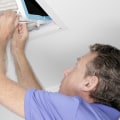In some cases, using an air purifier can cause allergies to worsen rather than improve. Most of the time, this is due to ionizing units that increase the amount of allergens and dust in the air. Utilizing a HEPA filter in your home can remove most airborne particles that could worsen allergies. But airborne particles aren't the only ones in your home. There's so much more to your carpets, bedding and curtains, and it rests on countertops and tables.
Therefore, it is important to keep these areas clean. It is also important, where possible, to eliminate the source of allergens and irritants. For example, the only effective way to keep tobacco smoke out of your home is to not smoke. Some air purifiers can irritate your allergies, not help them. Ionic electrostatic cleaners release ions, which force particles to adhere to walls or surfaces.
But they don't remove all particles from the air, and the ozone that is produced is a known irritant. Knowledge is power, and by reading about allergies and the different types of air purifiers that exist, you can empower yourself to make the right choices. It's not the cockroach itself that can cause an allergy outbreak, but what they leave behind - droppings, small scales on their bodies and saliva - can be inhaled and make allergies worse. They all had a fan that recycled the air and accounted for the noise that, depending on the model and configuration, ranged from a pleasant hum to a wind tunnel hum. Therefore, we decided to take a closer look at these issues and answer this question once and for all: will an air purifier make your allergies worse?Air purifiers can help clean the air in your home of unwanted particles, such as pet dander, allergens, and smoke. Unfortunately, there is no scientific evidence that air purifiers with ionizers that use ultraviolet light that supposedly kill bacteria are effective for allergies. I've been closely monitoring my usual symptoms - watery eyes and nose - to see if, as a manufacturer of a trumpet model in both wildly boastful and vague language claims, a household air purifier “completely revolutionizes the clarity of the air you breathe so you feel better”.Particles that cause pet allergies can be removed by using an air purifier equipped with a HEPA filter.
To help you filter your options and help you breathe a little easier, we spoke to an expert and compared several different brands for this list of our picks for the best air purifiers for allergies. My allergist recommended a good brand of mattress covers and pillows for my bed, and we have air filters in the attic where it's dusty and downstairs. As air is drawn into the purifier, the ionizer negatively charges it and releases it into the room where the negatively charged particles are attracted and adhere to the positively charged air particles in the room. There are many great air purifiers available but for people with frequent allergies, a more specific purification system is needed. While keeping your home clean is one of the best ways to prevent indoor pollutants from building up gradually, new research by the University of Queensland and Laval University in Canada suggests that vacuuming could be aggravating your allergies. Anyone can enjoy the benefits of an air purifier but if you experience frequent allergies you may be looking for one that specifically filters out particles that can cause allergic reactions. Using an air purifier with a HEPA filter between March and September should help alleviate some of the symptoms of hay fever, and they can be used together with antihistamines and nasal sprays as directed by a doctor or allergy specialist.



